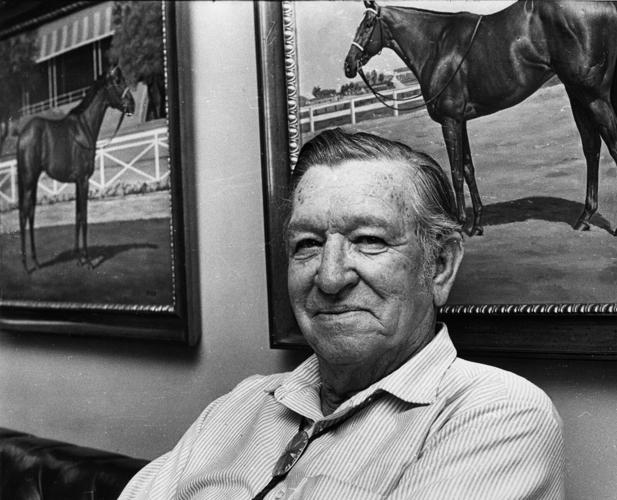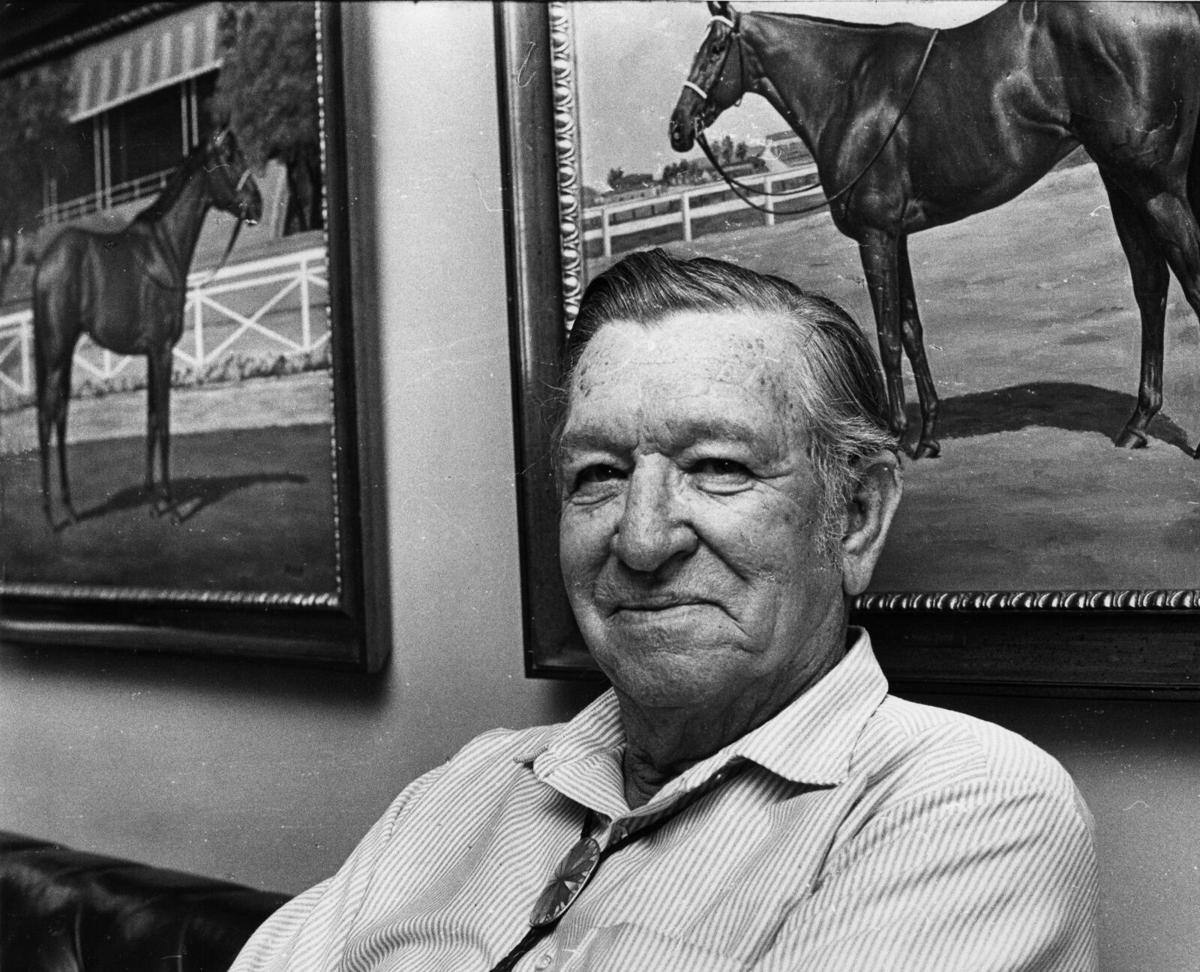J. Rukin Jelks was a key figure in Tucson horse racing and breeding, being a founder of the Tucson Horseman’s Association, which sponsored the first World’s Championship Quarter Horse Speed Trials.
Jelks developed his passion for animal husbandry while growing up on a family farm near McCrory, Arkansas, where he was born in 1899.
The passion began early, as he rode horses to school all the way through high school there.
Jelks entered the military during World War I, but it’s unknown where he served. After his return home, he spent his freshman year and part of his sophomore year studying agriculture at the University of Arkansas in Fayetteville, Arkansas.
But around that time he contracted tuberculosis, which led his parents to send him to Tucson, whose climate was well known for relieving the symptoms of T.B., to attend the University of Arizona.
During his time at the new university, he ran the 100-, 220- and 440-yard dashes as well as the hurdles on a couple of occasions against schools like the New Mexico Military Institute and the University of New Mexico.
In 1922, he graduated with a degree in animal husbandry. On Jan. 10, 1923, Jelks wed his childhood sweetheart Della Jeffries in McCrory and on the same day they returned to Tucson to start their new life together.

J. Rukin Jelks as child
Jelks found work in automobile sales, getting his first job at McArthur Bros. at the corner of Broadway and Scott Avenue where he sold Dodge vehicles. A few months later, Jelks formed a partnership with Erdis W. Hughes, and the Jelks and Hughes Motor Co. was born, as the REO distributor in town, which only lasted a couple of years.
In 1925, Mrs. Melville H. Haskell hosted a bridge party at the Tucson Golf and Country Club, located then at Broadway and Country Club Road, and among the guests she invited was Mrs. Rukin Jelks. This is the first time that members of the two families are known to have interacted; they would go onto become lifelong friends.
In early 1927, Della became pregnant, but the pregnancy was difficult, and after the birth of their son “Rukie” in October, her bright light faded to black. Her body was returned to Arkansas, and her newborn went to live with Jelks’ mother.
On May 30, 1929, Jelks wed Mary Haskell of Cleveland, Ohio, the sister of his friend Melville Haskell. The wedding took place on Melville Haskell’s Rincon Ranch, about 30 miles east of Tucson, in the Rincon Valley.
The newlyweds took up residence in a new, over-$20,000 Spanish-style home consisting of nine rooms and three bathrooms. The house was on a ranch, adjoining the Rincon Ranch, bought by Jelks earlier in the month. This house was the source of the name of Jelks’ ranch, the Casa Blanca Ranch or White House Ranch.
Soon after, Rukie came back to Tucson to live with his father and stepmother on the ranch. In time the Jelkses adopted a little girl named Barbara.
Within a few years Jelks began breeding horses, likely thoroughbreds before he bred quarter horses. He also built an exercising paddock and stable for his breeding facility.
At the time, there wasn’t any real racing in Tucson, except the rare match race, but Jelks and a young 65-pound lad by the name of Frank Figueroa began to develop and train race horses.
His first race track was constructed within a few years, in the Rincon Creek, but during the flood season it was damaged and forsaken for a better site believed to be closer to his home.
In February 1934, a half-mile match race between Jelks’ steed Skip against rancher Cleveland Putnam’s mount Hope, in Vail took place, with Hope winning.
In April 1935, the Jelkses attended the dedication of The Shrine of Santa Rita in the Desert, which was a gift from Vail resident Caroline Takamine Beach, built in memory of her late husband, scientist Jokichi Takamine. Mrs. Mary Jelks had donated “Mary’s Well,” which was located in the patio of the church.
In 1936, the local newspaper announced, “Mr. and Mrs. Rukin Jelks of Casa Blanca Ranch are owners of a fine new race horse, which arrived from Lexington, KY.” It’s believed the horse was Master Bunting, one of his top horses.
In January 1937, Jelks began to race some of his horses on the quarter-mile stretch and around the polo field at Bob Locke’s Moltacqua Horse Farm on Ajo Way and the Santa Cruz River, with the first race season beginning that month.
This track had no starting gate, grandstands or paddocks, and no betting of any kind was allowed. But this might have been the first organized or semi-organized horse racing in Tucson.
Over the next few months there were a total of six race meets, with Jelks mostly running a thoroughbred named Rincon Sun. His friend Mel Haskell also ran a thoroughbred, named Flora Upset, at several of the races.
In 1938, Rukin and Mary Jelks divorced. Soon after, Mary remarried and took the children to live on a ranch in Montana.

J. Rukin Jelks as a young man
In 1939, Jelks, with his wife and children gone, decided to rent out the Casa Blanca Ranch, but this deal went bad as the ranch home caught on fire and was a total loss. A few months later, Jelks sold his ranch to Robert Chatfield-Taylor, who changed the name to the X-9 Ranch.
On Aug. 25, 1939, Jelks married for the third time, wedding Frances Barry. The couple met at Ronstadt’s Hardware on Sixth Avenue, now the Ronstadt Transit Center site, where she was working at the time.
In early 1940, Jelks attended the first official American Quarter Horse Association (AQHA) convention in Texas. This new organization was formed to collect, record and preserve the pedigrees of the American quarter horse and publish a stud book.
In April 1940, Jelks purchased land from Adah B. Lineweaver (namesake of Tucson’s Lineweaver Elementary School) located between the Rillito River and River Road, just east of North First Avenue.
Here he had his new home and stables built in Sonoran-revival style, including saguaro-ribbed ceilings, double-thick burnt adobe walls, hand-hewn mesquite timbers and iron work from Mexico.
By November 1940, Bob Locke had purchased land along Sabino Canyon Road, near the Tanque Verde River, about eight miles from Tucson. On this property he built the Hacienda Moltacqua ranch and had just completed his new half-mile track, whose purpose was the training of racing horses and the staging of amateur race meets to see whose horses could run the fastest.
Locke, Jelks, Haskell, Jake Meyer, Clancy Wollard and other local horse owners and breeders formed the Tucson Horseman’s Association, which in turn sponsored the races at the track for the purpose of promoting good breeding to improve the horses of Arizona.
It also sponsored the first World’s Championship Quarter Horse Speed Trials, which for many years decided which quarter horse would bear the title World Champion Quarter Running Horse. The very first horse to win the speed trials was Clabber from Phoenix.
In early 1941, the track added pari-mutuel wagering.
After the first season (1940-41) ended, the association changed its name to the Southern Arizona Horse Breeders Association and expanded its membership to include horsemen/breeders outside of Tucson but continued to sponsor races at the Moltacqua track for the next two seasons. During this period, a sorrel mare named Shue Fly, from New Mexico, won the title World Champion Quarter Running Horse.
Toward the end of the 1942-1943 race season, Locke decided to sell his Hacienda Moltacqua ranch and race track, leaving local horse owners and breeders without a place to race their horses — but not for long.
Catch the excitement of horse racing at Rillito Park Race Track. Racing continues Saturdays and Sundays through April 3, 2022.
Archive photos: Horse racing at Rillito Park
Horse racing at Rillito Park
Updated
Mud-covered jockeys at the Tucson Turf Club at Rillito Park on Feb. 12, 1968.
J. Rukin Jelks
Updated
J. Rukin Jelks' Rillito Track, about 1944.
Horse racing at Rillito Park
Updated
Snow across the Santa Catalina Mountains as the horses run at Rillito Park in January, 1960.
Horse racing at Rillito Park
Updated
Rillito Park in 1953.
Horse racing at Rillito Park
Updated
Horses racing at Rillito Park in Nov, 1953.
Horse racing at Rillito Park
Updated
Opening day cover treatment for a Tucson Citizen story on horse racing at Rillito Park, ca. 1950s.
Horse racing at Rillito Park
Updated
Undated photo of horses racing at Rillito Park.
Horse racing at Rillito Park
Updated
Undated photo of horses down the stretch at Rillito Park.
Horse racing at Rillito Park
Updated
Jockey Ron Beverly wipes mud from his face after a 350 yard quarter horse race on a very wet track in January, 1992.
Horse racing at Rillito Park
Updated
Horses and jockeys round the final turn at Rillito Park in November, 1988.
Horse racing at Rillito Park
Updated
Chariot races at Rillito Park in 1993, organized by Ty Cobb of Sierra Vista.
Horse racing at Rillito Park
Updated
A close race at the Rillito Downs in November, 1978.
Horse racing at Rillito Park
Updated
This 1978 photo shows the largest crowd in recent years, 3,210, attended opening day at Rillito Downs and saw several close races.
Horse racing at Rillito Park
Updated
Horses spring from the gate at the Tucson Turf Club at Rillito Park in March, 1968.
Horse racing at Rillito Park
Updated
Undated photo of horses at Rillito Park.
Horse racing at Rillito Park
Updated
Horse racing at Rillito Park in 1944, prior to the grandstands.
Horse racing at Rillito Park
Updated
Rillito Park Race Track sign in 1955.
Horse racing at Rillito Park
Updated
Grandstands at Rillito Park in 1955.
Horse racing at Rillito Park
Updated
Rillito Park in 1952.
Horse racing at Rillito Park
Updated
Undated photo of horses down the stretch at Rillito Park. Likely 1950s.







